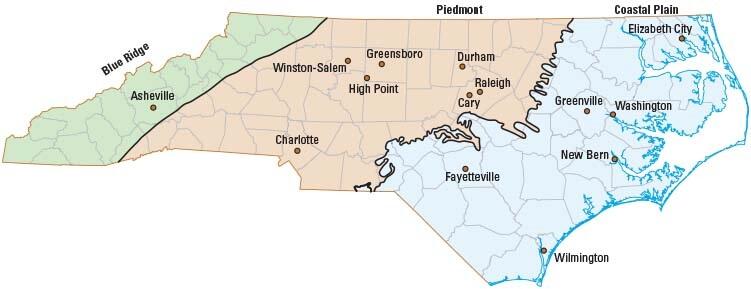Some Coastal Plain Streams Influenced by Animal Feeding Operations
Animal feeding operations have measureable effects on stream water quality in many agricultural watersheds in the North Carolina Coastal Plain, according to a new report by the U.S. Geological Survey.
Animal feeding operations have measureable effects on stream water quality in many agricultural watersheds in the North Carolina Coastal Plain, according to a new report by the U.S. Geological Survey.
USGS scientists took water samples from 54 agricultural sites in the Coastal Plain area (see map below) in order to assess water-quality differences among streams draining watersheds with and without concentrated animal feeding operations, or CAFOs. The samples were taken six times between June 2012 and April 2013 from 18 watersheds with no CAFOs; 18 watersheds with swine CAFOs; and 18 watersheds with both swine and poultry CAFOs.
The researchers found that 58 percent of the watersheds containing CAFOs had distinct differences in water quality reflecting swine and/or poultry manure effects. However, 28 percent of the watersheds showed no measurable manure effects on water quality, despite having CAFOs upstream.
“Overall the study showed that agricultural fields treated with animal manures at swine CAFOs influenced water-quality parameters in many, but not all, of the streams that were studied,” said USGS hydrologist Stephen Harden, lead author of the study. “Variations in environmental settings among the sites influenced whether or not the effects of swine CAFOs on stream water quality were evident.”
The watershed groups with swine and/or poultry CAFOs had higher median concentrations of nutrients such as ammonia plus organic nitrogen, ammonia, nitrate plus nitrite, and total nitrogen, as well as major ions such as magnesium, sodium, potassium and chloride, than the group with no animal operations. “Given the significant differences found for most of the nitrogen constituents, it was unexpected that no significant differences were identified for phosphorus between the watershed groups,” said Harden.
In eastern North Carolina, nutrient surpluses in streams have contributed to water-quality problems in the Tar-Pamlico and Neuse River Basins, particularly in the estuaries. Excessive inputs of nitrogen and phosphorus to nutrient-sensitive waters can stimulate algal blooms and lead to fish kills.
Agricultural activities, including crop and animal production, are considered important contributors of nitrogen and phosphorus to streams in the Coastal Plain.
At a typical swine CAFO, waste manures produced by the animals are flushed from the swine barns and collected in one or more storage lagoons. Wastewater from the lagoons is applied periodically to nearby fields, which provides beneficial nutrients to support the production of agricultural crops.
North Carolina is one of the Nation’s leaders in animal production, with over 2,300 CAFOs regulated by the North Carolina Department of Environment and Natural Resources, Division of Water Resources. Most of the permitted CAFOs, about 2,000, consist of swine production facilities that are located in the Coastal Plain, and as such, there is substantial interest in understanding their influence on stream water quality.
The study was conducted in cooperation with the North Carolina Department of Environment and Natural Resources, Division of Water Resources.
A full copy of the report, "Surface-Water Quality in Agricultural Watersheds of the North Carolina Coastal Plain Associated with Concentrated Animal Feeding Operations" is available online.


